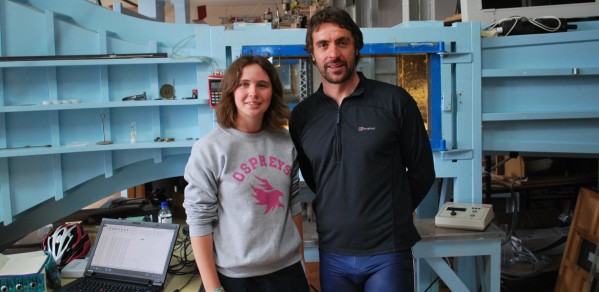
What can the rise and fall of heart rate tell you about your fitness? Just how important is rolling resistance to track cyclists? Can the Velodrome be turned into a wind tunnel?
It’s good to see the brains of Cambridge being applied to help our Olympic Team
Jason Queally
These are questions 4th year undergraduates have tackled this year with projects put forward by British Cycling. One such student, Helen Webster, at the Department of Engineering has been part of the investigating team. Olympic Cycling Gold Medallist, Jason Queally visited the department to take a look at her experiments and join in as a ‘sample’ rider. Brave man!
In advance of Stage 3 of ‘Le Tour de France’ which took place in Cambridge just a matter of days ago, research is being undertaken by Helen as a continuation to her 4th year project, in conjunction with the Olympian. Jason Queally, who was the first medal winner of the new era in British Cycling, winning gold in Australia, is now the British Cycling Research and Innovation test rider. Jason said: “It’s good to see the brains of Cambridge being applied to help our Olympic Team. There are some great ideas being looked at and I’m more than happy to help as an experimental part or with any advice from the coal face.”
Helen said in response to the question: ‘why conduct research into this’? “Finding ways to lower the drag of cyclists is not easy as the rules are very restrictive. Key is good experimental method. If we can isolate parts rather than test the whole bike and rider it’s much easier to see gains in that sub-system. However in aerodynamics everything seems to affect everything else, so care guided by theoretical understanding is paramount.”
Tony Purnell is Head of technical development for the Great Britain Cycling Team and Royal Academy of Engineering Visiting Professor at the University of Cambridge.
“I believe 4th year projects are a wonderful way to have a good look at topics of real interest, especially those that are viewed as high risk in terms of producing something useful and those that are hunches but difficult to get past a funding review. The Cambridge students always do a good to very good job and this year all seven of the projects have provided genuine insight. We also get marvellous advice from the academic supervisors. Team GB when they compete in 2016 at Rio, will have a few incremental gains courtesy of the Department of Engineering.”

